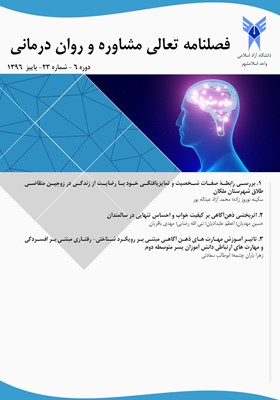بررسی رابطۀ صفات شخصیت و تمایزیافتگی خود با رضایت از زندگی در زوجین متقاضی طلاق شهرستان ملکان
محورهای موضوعی : فصلنامه تعالی مشاوره و روان درمانی
سکینه نوروز زاده
1
,
محمد آزاد عبداله پور
2
*
![]()
1 - دانشجوی کارشناسی ارشد گروه روانشناسی عمومی،واحد مهاباد، دانشگاه آزاد اسلامی، مهاباد، ایران.
2 - هیات علمی گروه روانشناسی دانشگاه آزاد اسلامی واحد مهاباد
کلید واژه: رضایت از زندگی, صفات شخصیت, تمایزیافتگی خود,
چکیده مقاله :
هدف: تحقیق حاضر باهدف بررسی رابطۀ صفات شخصیت و تمایزیافتگی خود با رضایت از زندگی در زوجین متقاضی طلاق شهرستان ملکان صورت پذیرفت. روش: پژوهش حاضر پژوهش توصیفی و از نوع همبستگی بود. جامعه آماری این تحقیق زوجین مراکز مشاوره راه زندگی شهرستان ملکان (120= N) در فاصله زمانی مهرماه تا اسفند 1396 بود که نمونه آماری نیز بهصورت سرشماری 120 نفر انتخاب گردید. همچنین روش نمونهگیری بهصورت هدفمند بود. اطلاعات از طریق مقیاس تمایزیافتگی خود (DSI) اسکورن و فریدلندر (1998)؛ ویژگیهای شخصیتی نئو (NEO – FFI) (1986) و پرسشنامه رضایت از زندگی داینر وپاوت (SWLS) (1985) جمعآوری گردید. برای تجزیهوتحلیل دادههابا استفاده از نرم افزار spss در سطح معناداری 0.05 و با استفاده از آزمون کولموگروف اسمیرنف برای بررسی نرمال بودن توزیع دادهها و همبستگی پیرسون و رگرسیون خطی چندگانه برای آزمون فرضیهها استفاده شد. یافته ها: یافتهها نشان داد بین بعد برونگرایی، وظیفهشناسی، گشودگی به تجربه و خوشایندی با رضایت از زندگی در زوجین متقاضی طلاق در سطح معناداری (p≤0.05) رابطه مثبت و معناداری وجود داشت. اما بین روان رنجورخویی و رضایت از زندگی در زوجین متقاضی طلاق در سطح (p≤0.05) رابطه معناداری وجود نداشت. همچنین نتایج نشان داد که بین بعد واکنشپذیری، جایگاه من و هماهنگی با دیگران با رضایت از زندگی در زوجین متقاضی طلاق در سطح معناداری (p≤0.05) رابطه مثبت و معناداری مشاهده گردید اما بین بعد گریزعاطفی و رضایت از زندگی در زوجین در سطح (p≤0.05) رابطه معناداری یافت نشد. نتیجه گیری: نتایج این پژوهش بر تجارب افراد در خانواده اصلی و اهمیتی که این تجارب در شکلدهی روابط صمیمی بعدی و رضایت زناشویی دارند، تأکید میکند.
Purpose: The aim of this study was to investigate the relationship between personality traits and self-differentiation with life satisfaction in couples seeking divorce in Malekan city. Methodology: The present study was a descriptive and correlational study. Information through its Differential Scale (DSI) Scorn and Friedlander (1998); the personality traits of Neo (FEO) (1986) and the Dynamic Life Satisfaction Questionnaire (SWLS) (1985) were collected. The statistical population of this study was a pair of life counseling centers in Malekan city (N = 120), and the statistical sample was selected as a census of 120 people. The sampling method was also targeted. To analyze and analyze the data, the Kolmogorov-Smirnov test was used to test the normality of the data distribution and Pearson correlation and multiple linear regression to test the hypotheses. Results: The present study was a descriptive and correlational study. The statistical population of this study was a pair of life counseling centers in Malekan city (N = 120) between October and March 2017, and the statistical sample was selected as a census of 120 people. The sampling method was also targeted. Information through its Differential Scale (DSI) Scorn and Friedlander (1998); the personality traits of Neo (FEO) (1986) and the Dynamic Life Satisfaction Questionnaire (SWLS) (1985) were collected. To analyze and analyze the data, using SPSS software at a significance level of 0.05 and using the Kolmogorov-Smirnov test to test the normality of data distribution and Pearson correlation and multiple linear regressions were used to test the hypotheses. Conclusion: The results of this study emphasize the experiences of individuals in the main family and the importance of these experiences in the formation of later intimate relationships and marital satisfaction.
_||_

